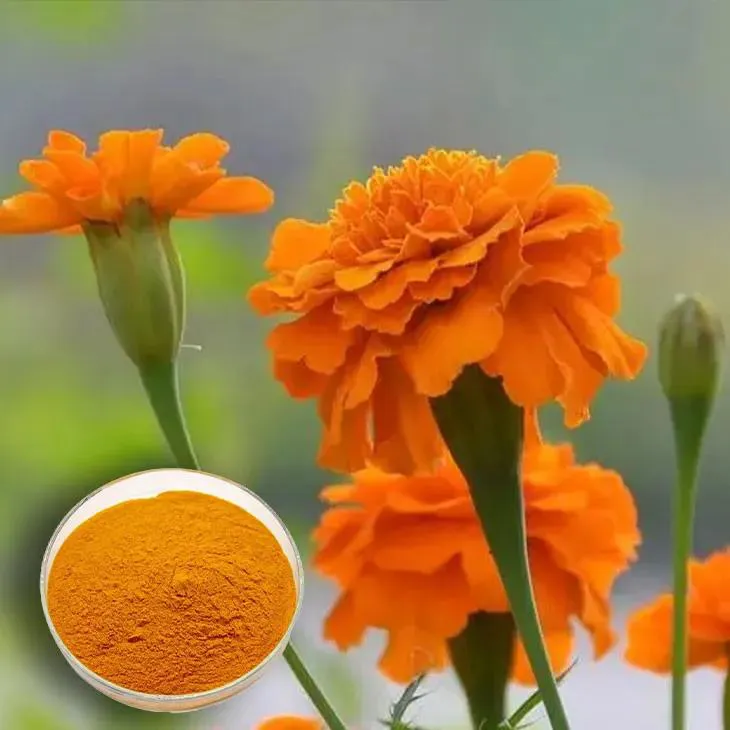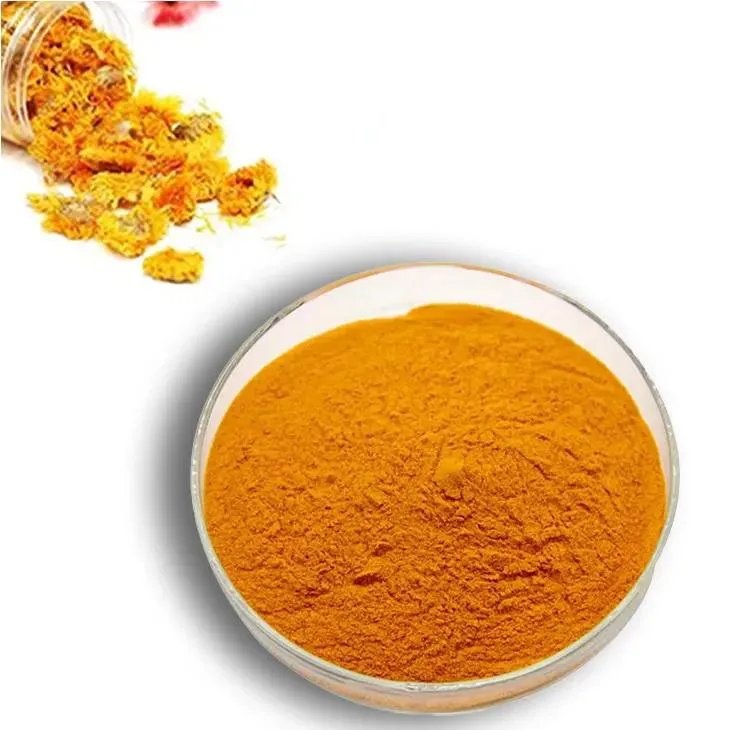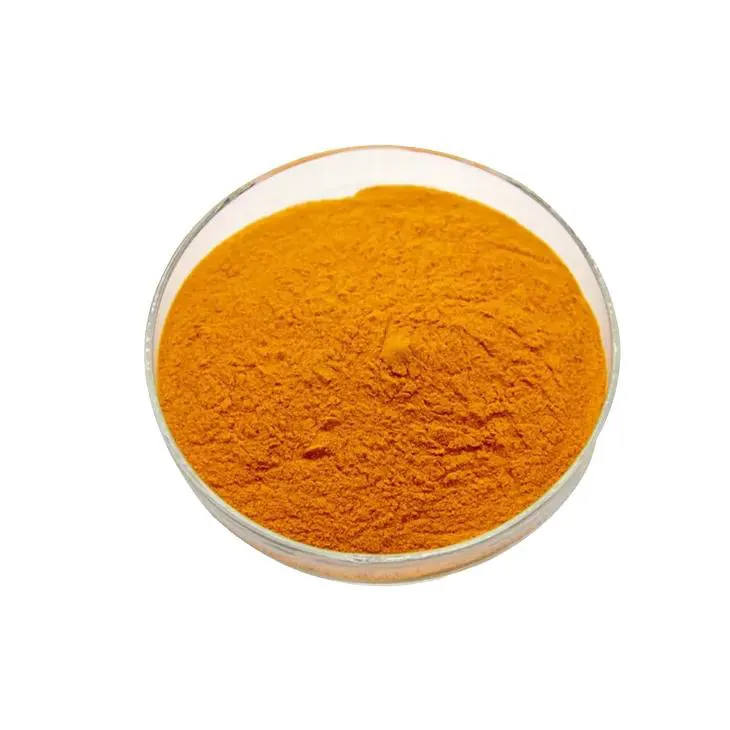- 0086-571-85302990
- sales@greenskybio.com
Five Efficacy of Marigold Extract + Dosage, Side Effects
2024-11-14

1. Introduction to Marigold Extract
Marigold Extract is derived from the marigold flower, scientifically known as Tagetes erecta or Tagetes patula. This extract has been used for centuries in traditional medicine and is now gaining popularity in modern health and wellness applications. The active components in Marigold Extract include flavonoids, carotenoids, and essential oils, which contribute to its various properties.

2. Five Efficacy of Marigold Extract
2.1 Anti - Inflammatory Properties
Marigold extract has been shown to possess anti - inflammatory effects. The flavonoids present in the extract, such as Quercetin and kaempferol, help to reduce inflammation in the body. This can be beneficial for conditions such as arthritis, where chronic inflammation causes pain and joint damage. Studies have demonstrated that marigold extract can inhibit the production of inflammatory mediators, thus alleviating the symptoms of inflammation.
2.2 Antioxidant Activity
The carotenoids in marigold extract, particularly lutein and zeaxanthin, are powerful antioxidants. Antioxidants play a crucial role in protecting the body from oxidative stress, which is caused by free radicals. Free radicals are unstable molecules that can damage cells and contribute to various diseases, including cancer and heart disease. By neutralizing free radicals, marigold extract helps to maintain the health of cells and tissues, and may also slow down the aging process.
2.3 Skin Health
Marigold extract is widely used in skincare products due to its multiple benefits for the skin. It has anti - inflammatory properties that can soothe irritated skin, making it suitable for treating conditions like eczema and dermatitis. Additionally, its antioxidant activity helps to protect the skin from damage caused by environmental factors such as UV radiation. Marigold extract can also promote wound healing, as it stimulates the growth of new skin cells.
2.4 Eye Health
The lutein and zeaxanthin in marigold extract are essential for maintaining good eye health. These antioxidants are concentrated in the macula of the eye, which is responsible for central vision. They help to protect the eyes from damage caused by blue light and oxidative stress, reducing the risk of age - related macular degeneration (AMD) and cataracts. Consuming marigold extract or foods rich in these carotenoids can support the long - term health of the eyes.
2.5 Digestive Health
Marigold extract may also have positive effects on digestive health. It has been traditionally used to treat digestive disorders such as indigestion, stomach ulcers, and diarrhea. The extract may help to soothe the lining of the digestive tract, reduce inflammation, and promote the growth of beneficial gut bacteria. However, more research is needed to fully understand its mechanisms of action in the digestive system.

3. Dosage Guidelines
The appropriate dosage of marigold extract can vary depending on several factors, including the form of the extract (e.g., capsule, tincture, or topical preparation), the intended use, and individual factors such as age, health status, and body weight.
3.1 Oral Dosage
When taken orally for general health benefits, a typical dosage of marigold extract in capsule form may range from 300 - 500 mg per day. However, for specific conditions such as treating inflammation or digestive disorders, higher dosages may be required under the guidance of a healthcare professional. For tinctures, the dosage is usually measured in drops, and it is important to follow the instructions on the product label.
3.2 Topical Dosage
If using marigold extract in a topical preparation for skin conditions, the concentration of the extract in the product will determine the appropriate amount to use. In general, products with a marigold extract concentration of 5 - 10% are commonly used for skincare. However, it is advisable to start with a small amount and test for any allergic reactions before applying more widely.

4. Side Effects
While marigold extract is generally considered safe for most people when used appropriately, there are some potential side effects to be aware of.
4.1 Allergic Reactions
Some individuals may be allergic to marigold extract. Allergic reactions can range from mild symptoms such as skin rashes, itching, and redness to more severe symptoms like difficulty breathing and swelling of the face, lips, or tongue. If you have a known allergy to plants in the Asteraceae family (which includes marigolds), you should avoid using marigold extract.
4.2 Gastrointestinal Disturbances
In some cases, taking marigold extract orally may cause gastrointestinal side effects such as nausea, vomiting, or diarrhea. These symptoms are more likely to occur at higher dosages or in individuals with sensitive digestive systems. If you experience any of these symptoms, it is advisable to stop using the extract and consult a healthcare professional.
4.3 Interaction with Medications
Marigold extract may interact with certain medications. For example, it may enhance the effects of blood - thinning medications, increasing the risk of bleeding. It is important to inform your healthcare provider if you are taking any medications, including over - the - counter drugs, before using marigold extract to avoid potential drug interactions.

5. Conclusion
Marigold extract offers a range of potential health benefits, including anti - inflammatory, antioxidant, skin - health - promoting, eye - health - protecting, and digestive - health - supporting properties. However, it is essential to follow proper dosage guidelines and be aware of the potential side effects. If you are considering using marigold extract for a specific health condition, it is advisable to consult a healthcare professional first. With proper use, marigold extract can be a valuable addition to a natural health regimen.
FAQ:
What are the five main efficacy of Marigold Extract?
Marigold extract has several notable efficacies. Firstly, it is rich in antioxidants like flavonoids and carotenoids, which can help combat oxidative stress in the body. Secondly, it may have anti - inflammatory properties, potentially reducing inflammation in various parts of the body. Thirdly, it is often associated with promoting eye health, as it contains substances that can support the retina and vision. Fourthly, it might have antibacterial effects, which could be beneficial in fighting off certain infections. Fifthly, it may also contribute to skin health, for example, by reducing skin irritation and promoting a healthy complexion.
What are the dosage guidelines for Marigold Extract?
The appropriate dosage of Marigold extract can vary depending on several factors such as the form of the extract (e.g., capsules, tinctures), the intended use, and individual health conditions. In general, for a standardized marigold extract supplement in capsule form, a common dosage might be around 300 - 500 mg per day. However, it is crucial to follow the instructions on the product label or consult a healthcare provider. For topical applications, the concentration and amount used would also be determined based on the specific product and the area of application.
What are the possible side effects of Marigold Extract?
While Marigold extract is generally considered safe for most people, some possible side effects may occur. Allergic reactions are a potential concern, especially in individuals who are sensitive to plants in the Asteraceae family. Symptoms of an allergic reaction can include skin rashes, itching, swelling, or difficulty breathing. In some cases, if taken in excessive amounts orally, it may cause gastrointestinal discomfort such as nausea, vomiting, or diarrhea. Also, if applied topically in high concentrations or for extended periods without proper dilution, it could potentially cause skin irritation.
Can Marigold Extract be used for treating eye diseases?
Marigold extract contains certain compounds like lutein and zeaxanthin that are beneficial for eye health. These substances are known to accumulate in the retina and may help protect against age - related macular degeneration and cataracts. However, while it can be a part of a preventive or complementary approach to eye health, it should not be considered a sole treatment for serious eye diseases. People with existing eye conditions should always consult an ophthalmologist for proper diagnosis and treatment.
Is Marigold Extract suitable for all skin types?
Marigold extract has properties that can be beneficial for many skin types. Its anti - inflammatory and antioxidant properties can help soothe irritated skin, reduce redness, and protect against environmental damage. However, as mentioned before, some people may be allergic to it. So, those with sensitive skin or a history of allergies should perform a patch test before using products containing Marigold extract on a large area of the skin. Overall, it can be suitable for a wide range of skin types when used appropriately.
Related literature
- The Pharmacological Properties of Marigold Extract: A Comprehensive Review"
- "Marigold Extract in Health and Disease: Current Understanding and Future Perspectives"
- "Dosage Considerations for Herbal Extracts: The Case of Marigold"
- ▶ Hesperidin
- ▶ Citrus Bioflavonoids
- ▶ Plant Extract
- ▶ lycopene
- ▶ Diosmin
- ▶ Grape seed extract
- ▶ Sea buckthorn Juice Powder
- ▶ Fruit Juice Powder
- ▶ Hops Extract
- ▶ Artichoke Extract
- ▶ Mushroom extract
- ▶ Astaxanthin
- ▶ Green Tea Extract
- ▶ Curcumin
- ▶ Horse Chestnut Extract
- ▶ Other Product
- ▶ Boswellia Serrata Extract
- ▶ Resveratrol
- ▶ Marigold Extract
- ▶ Grape Leaf Extract
- ▶ New Product
- ▶ Aminolevulinic acid
- ▶ Cranberry Extract
- ▶ Red Yeast Rice
- ▶ Red Wine Extract
-
Chaste Berry Extract
2024-11-14
-
Giant Knotweed Extract
2024-11-14
-
Garcinia Cambogia Extract
2024-11-14
-
Avocado Extract Powder
2024-11-14
-
Beetroot juice Powder
2024-11-14
-
Lemon Extract
2024-11-14
-
Dandelion Root Extract
2024-11-14
-
Centella Asiatica Extract
2024-11-14
-
Eyebright Extract
2024-11-14
-
Cranberry Extract
2024-11-14





















